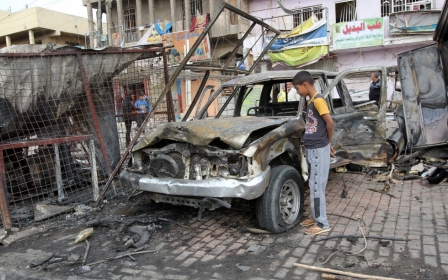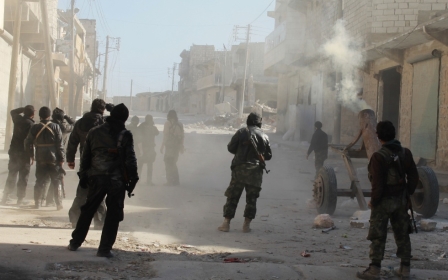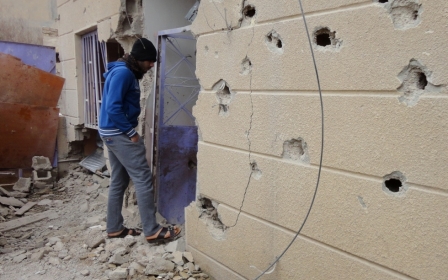1300 hostages on Iraqi campus freed

Two explosions were heard inside the university amid reports about casualties.
According to al-Mahalawi, militants had taken a number of students and teachers hostage.
Iraqi security forces quickly besieged the university building in an attempt to free the hostages.
36 people dead in twin suicide bombings
This takes place following heavy fighting between security forces and militants and twin suicide bombings killed 36 people in north Iraq Friday, as deadly violence shook other parts of the country.
There are also emerging reports that fresh clashes have killed 59 police and militants in north Iraq.
The United Nations said, meanwhile, that nearly 480,000 people have fled their homes in Anbar province, where security forces have been battling anti-government fighters for over five months.
Clashes between security forces and militants broke out in several areas of Nineveh provincial capital Mosul on Friday morning and, according to Governor Atheel al-Nujaifi, continued into the night.
In west Mosul, four police, three soldiers and 16 militants were killed in fighting, while a mortar round killed a civilian, police and a medical official said.
Three more soldiers were killed clashes with militants in east Mosul, while security forces shot dead five would-be suicide bombers in the Hamam al-Alil area, south of the city.
And two suicide bombers blew up vehicles in Al-Muwaffaqiyah, a village east of Mosul that is populated by members of the minority Shabak community, killing four people and wounding 45, police and medical officials said.
Iraq's 30,000 Shabaks largely follow a blend of Shiite Islam and local beliefs viewed as heretical by Sunni extremists, and have been periodically targeted in attacks.
Violence elsewhere in Iraq killed at least nine more people, security and medical sources said.
In Baquba, north of Baghdad, shelling and a car bomb killed a total of four people and wounded six, while shelling in the Saba al-Bur area, also north of the capital, killed at least five people and wounded at least 14.
The violence came a day after militants launched a major attack on the city of Samarra, north of Baghdad, occupying multiple neighbourhoods.
Soldiers, police and tribal fighters backed by helicopters eventually regained control, a senior army officer said, but only after heavy fighting that officials said killed 12 police and dozens of militants.
Prime Minister Nuri al-Maliki said in a statement on Friday that the Samarra assault was aimed at the Al-Askari Shiite shrine in the centre of the city, terming it "another failed attempt to provoke sectarian strife."
The areas occupied by militants were however located in eastern Samarra, and they would have had to advance significantly farther to threaten the shrine, which was bombed by extremists in 2006, setting off a bloody Sunni-Shiite sectarian conflict.
The allegation itself that the revered shrine was the target has the potential to increase the already-significant sectarian tensions plaguing the country.
Anbar crisis displaces nearly 480,000
On Friday, spokesman Adrian Edwards said the UN refugee agency believes "close to 480,000" people have fled their homes in Anbar province, west of Baghdad, where security forces and anti-government fighters have battled for control for over five months.
They join some 1.1 million others displaced during past years of violence in Iraq.
The crisis in Anbar, which shares a long border with civil war-hit Syria, erupted in late December when security forces dismantled a longstanding Sunni Arab protest camp near provincial capital Ramadi.
Anti-government fighters subsequently seized all of the city of Fallujah, just a short drive from Baghdad, and parts of Ramadi.
Despite months of clashes, shelling and missile strikes, no resolution is in sight.
Violence is running at its highest levels since 2006-2007, when tens of thousands were killed in sectarian conflict between Iraq's Shiite majority and Sunni Arab minority.
More than 900 people were killed last month, according to figures separately compiled by the United Nations and the government.
So far this year, more than 4,300 people have been killed, according to AFP figures.
Officials blame external factors for the rise in bloodshed, particularly the Syrian conflict, but analysts say widespread Sunni Arab anger with the Shiite-led government has also been a major factor.
New MEE newsletter: Jerusalem Dispatch
Sign up to get the latest insights and analysis on Israel-Palestine, alongside Turkey Unpacked and other MEE newsletters
Middle East Eye delivers independent and unrivalled coverage and analysis of the Middle East, North Africa and beyond. To learn more about republishing this content and the associated fees, please fill out this form. More about MEE can be found here.




